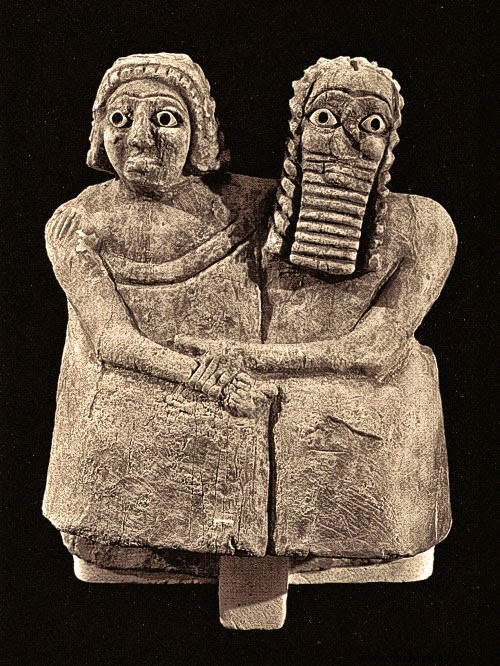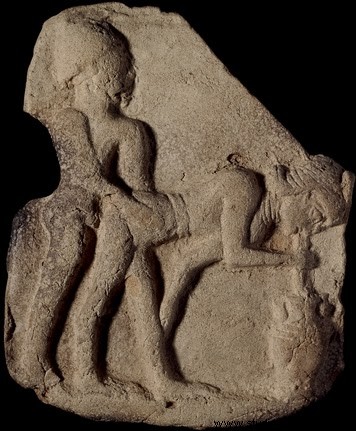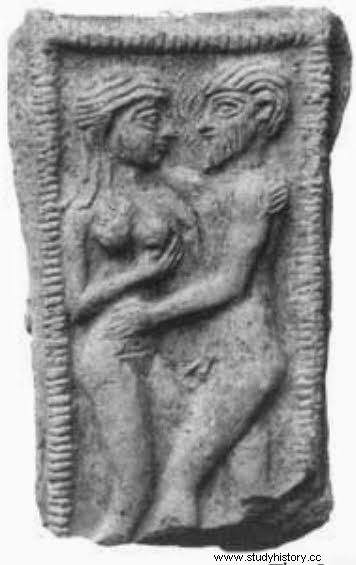Herodotus recounts in his Nine Books of History that the women of Babylon had to go to the Temple of Milita to lose their virginity with the first man who gave a simple coin in exchange. There is no doubt that it is a good anecdote, especially based on the fact that a Greek like Herodotus must have felt in Babylon like Paco Martínez Soria's character in “The city is not for me”. The bad thing is that some authors make the mistake of extrapolating the Babylonian culture to that of the entire Mesopotamian history. And it's a big mistake, because centuries before Babylon, in Sumer, the attitude towards sex was quite different.
For a Sumerian of the II Dynasty of Ur, for example, virginity had not the slightest value. Too bad a girl was going to go to a temple to lose her when they didn't take her into consideration. To such an extent they cared little, that in the Sumerian marriage five or six months of premarital relations prior to the wedding were added, with sex included, and during which the marriage agreement could be broken without problem. A typical saying has been preserved that goes:“Should I save my belly for the wind? ”.

Sumerians married many years ago
In Sumer, marriage bore little resemblance to the Judeo-Christian institution we know. Between the two rivers, it was a simple social contract with no religious connotations, although a priest/isa acted as witness. After all, in every contract there was always a clergy witness. For the Sumerians, sex was good, and should be practiced as a fundamental part of life, on the one hand because the greatest goddess, Inanna (Ishtar), she ordered it, and on the other hand because she allowed them to have children. Precisely, in the passage of the prostitute Shamhat in the Epic of Gilgamesh , it is indicated that for the Sumerians civilization came to man from the hand of sexuality. The biggest festival of the two rivers was the New Year, which was celebrated in honor of Inanna, and during which sex was practiced in every corner. And this "every corner" is not in a figurative sense. They had no prejudice when it came to copulating in public. In any tavern, a customer could do it in front of the others with a "beer wife", who were slaves hired for such a task.

For the inhabitants of Mesopotamia, having children was fundamental, since the current desert of Iraq, in those days, was a great savannah with cedar forests and large swamps surrounding the southern cities. Those swamps produced fevers that killed 7 out of 10 children before puberty. Losing a child meant losing a member of the “production unit”. It was a personal and social tragedy. That is why they tried to have as many of them as possible. It is thought that both polygamy and polyandry were permitted in archaic times. Both were abolished by King Urulkagina , but over time polygamy returned as a system to have additional offspring, since the laws in that aspect were very liberal. A man could have consorts, whose children had all rights, including inheritance. If a woman got tired of giving her husband children, she could give him a slave as a concubine, and her children also had all her rights. The wife could have her lovers as long as her husband gave her permission to do so. They used to give it? Well, it seems that yes, since she was little worried that she would get pregnant. If that happened, the child would become her husband's. For a Sumerian it was a victory:she was left with the son of another.
Homosexuality was not frowned upon either, although jokes were not spared on the subject. In the cult of Inanna we find transvestite priests, the Assinum . The biggest sexual taboo they had was towards incest, which was considered something frightening. So much so that the father or mother who practiced it was sentenced to death, after paying very heavy fines.
And single mothers? Well, no problem. At most, they found it curious that a mother would give up having her “production unit”, but they did not despise her for it. Sargon of Akkad himself, founder of the Akkadian empire, boasted of being the son of a single mother, and that had not created any trauma for him.

Inanna
Among the priestesses, sex became a social and religious function. In the cult of Inanna, they were sacred prostitutes and exhibited their sexuality for religious reasons and out of compassion. There was a type of priestesses who were forbidden to have sex, the Naditu . They were the closest thing to the Christian nuns of today, since they had to live secluded in the temple without being able to leave. However, the sexual taboo only fully reaches them in the more patriarchal Babylonian society. Previously, until the Third Dynasty of Ur, they were only forbidden to have children. This is because they are recruited, not for sexual reasons, but for social reasons. If you didn't want to have problems with your nephews and the inheritance, you ruled as Naditu your sister to a temple. Not being able to have children… issue resolved. However, they did not have sex prohibited in many cities, so they resorted to more… pornographic systems (there are very concrete representations of how they managed to have sex without procreation). However, and this is even more curious, they were allowed to adopt, and that must have produced more than one surprise when the brothers opened the will.

Sumerian bed scene
Finally, and to give us an idea of the importance they gave to sex, it should be noted that hundreds of votive offerings were discovered in the remains of the Eanna, Inanna's great sacred precinct in the city of Uruk. At first it was thought that they were to ask for children, since a certain character of fertility is attributed to the goddess, although that character was not as great as some think, she was not even a mother goddess, despite the fact that it is said sometimes very wrong. Today it is known that these objects were not to ask for children, but to ask for sex, an abundant and pleasant sex.
Due to elements like all these, the Sumerians are today a strange society, but without a doubt, fascinating.
